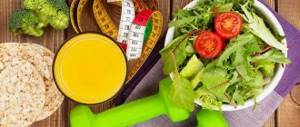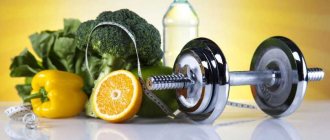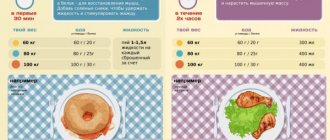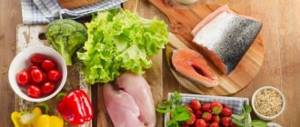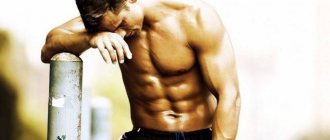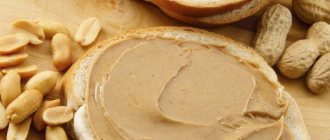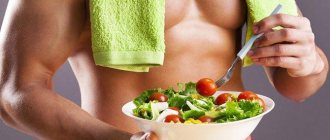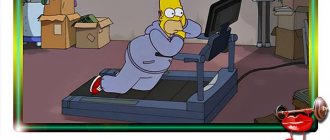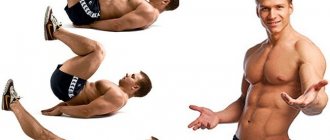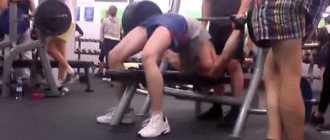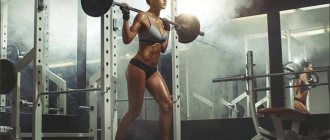Foods, drinks and dishes that can be consumed before training
We have already figured out what you need to eat before training, now let’s talk about what you can eat before training.
Meals before training should contain proteins and carbohydrates to saturate the body, eliminate hunger and energize you for fruitful exercise.
It’s good to add cereals to your diet:
- rice;
- buckwheat;
- oatmeal.
Dietary (lean) meat, good for:
- chicken (breast);
- turkey.
Other useful foods that should be included in your diet include:
- Fruits (apple, banana), fruit salad from any fresh fruit dressed with yogurt.
- Muesli.
- Mix of nuts and dried fruits.
- Smoothie (vegetables, fruits).
- Omelette with vegetables.
- Turkey cabbage rolls.
- Cottage cheese with the addition of fruits or berries.
- Homemade protein bars.
- Low-fat yogurt.
- Protein shakes.
- Almond butter with celery.
- Sweet potatoes and broccoli + lean meats.
- Fish and vegetables.
- Whole grain breads.
You can drink coffee without adding milk or cream, green tea, sweet black tea immediately before training.
A selection of healthy products will allow everyone to choose what they like.
How to eat before training
Different foods need to be eaten at different times before you start exercising. It is advisable to eat bulk foods such as meat, side dishes, and bread an hour or two before you start exercising.
This is important so that the stomach has time to digest food. And dense foods, such as porridge, cottage cheese, vegetables or fruits, can be eaten half an hour to an hour before the start of training
This will save you from feeling hungry during the process.
It is not recommended to eat immediately before training. Since the digestion process will greatly interfere with physical activity.
You can drink it at any time, since the liquid practically does not interfere with the fat burning process, on the contrary, it helps it.
Healthy and unhealthy foods are two sides of the same coin
Those who have been following my blog for a long time know that I am a supporter of healthy and separate nutrition, but being an objective person, I want to tell you about all aspects of pre-workout nutrition without missing out on the positive effects of foods that are considered unhealthy. I will give an example of the famous American powerlifter CT Fletcher, who for a long time was at the top of world fame. In his interviews, he has repeatedly stated that he has never used anabolic steroids, although they were repeatedly offered to him. Another thing is that he constantly lived in fast foods such as McDonald's, and could eat four Big Macs with fries at a time, drink a couple of liters of cola and snack on pie. CT “Plush Beard” admitted that he loved to eat a lot and really felt that he was getting stronger every day and this is no wonder, because one such meal is two or even three daily calorie intake for an ordinary person, which is in a compartment with brutal work in the gym it gave amazing results. True, in the end this bearded monster underwent very serious heart surgery and still blames his diet for this. Don't believe me? Watch a few of his workouts with our domestic fitness specialist Denis Semenikhin, I highly recommend it for general development.
But why am I saying this? It's simple. Sometimes the goal justifies the means to achieve it, but when the price is the risk of premature death, then it makes sense to think several times before embarking on this path.
Post-workout nutrition
What to eat after training? Within half an hour after training, it is necessary to close the protein-carbohydrate window, during which the body experiences a strong need for nutrients. If you replenish your body with proteins and carbohydrates at this moment, this will help the body support your muscles.
You need to close the anabolic window 30 minutes after exercise. It is recommended to do this with a protein-carbohydrate combination at the rate of 60 to 40. On the day of aerobic exercise, give 60% to carbohydrates, 40% to proteins. On days of strength and aerobic strength training, on the contrary, 60% are proteins and 40% are carbohydrates. Examples of post-workout nutrition:
- Protein shake with low-fat milk
- Low-fat cottage cheese with fruits
- Omelette or eggs with bread
- Lean chicken sandwiches
If you want to lose weight, then the calorie content of the dish should be about half as much as you spent in class. For example, while exercising, you burned 500 kcal. This means that within half an hour after it ends, eat a protein-carbohydrate dish with an energy value of 250 kcal. Protein and carbohydrates should be a 60/40 mix depending on the type of workout you are doing. A full meal should be 1.5-2 hours after this intermediate meal after training.
If you train in the morning on an empty stomach or after a small snack, then after training it is quite acceptable to have a full breakfast 30-45 minutes later. But this option is not suitable for those who are working on muscle growth; in this case, it is better to stick to the standard option described above.
What should you not eat after a workout?
First, avoid fatty foods (including full-fat milk and fatty cottage cheese). Fat prevents the absorption of nutrients into the blood, so it is advisable to eat only low-fat foods after exercise. Secondly, after training, you should not consume products containing caffeine, which interferes with the use of protein for muscle recovery.
By following these simple pre- and post-workout nutrition tips, you'll improve your performance and take another step toward achieving the body of your dreams. However, remember that the issue of nutrition before and after training is not the main one for those who want to lose weight and tone their body
The most important thing is to eat throughout the day, maintain a general calorie deficit, and consume enough proteins, carbohydrates and fats. Therefore, you can always adjust the menu to suit your individual capabilities.
Share on social networks:
Supplements affecting muscle growth
Serious power loads lead to the destruction of muscle tissue. Compensation for this unfavorable effect of intensive training is carried out due to large energy expenditures during exercise. In order for muscles to grow, it takes a certain amount of time and feeding the body with components that give an impetus to increasing the volume of muscle fibers. Substances entering the body from food are not always sufficient to achieve such an effect. Protein and carbohydrates inhibit the destruction processes and stimulate muscle mass to grow. They are indispensable for athletes.
These components are intensively spent during training and require replenishment. There is a special period of time called the protein and carbohydrate window. It is best to consume these substances and occurs within the first 15-30 minutes after completing a workout. The ideal choice would be highly digestible foods. These can be gainers or protein shakes.
Minerals, vitamin complexes and other supplements do not have a direct effect on muscle growth. They are catalysts that help stimulate the process of transformation of proteins absorbed in the body into muscle fibers. During training, not only protein is consumed, but also glycogen, which is a special type of carbohydrate that has a direct impact on energy production. In other words, this connection allows you to have the strength to carry out the training. Its deficiency, on the contrary, causes lethargy and the inability to exercise and swing normally.
And if you train intensively, it is necessary to restore lost reserves of proteins and carbohydrates. The best time to take carbohydrates and proteins is considered to be the first 15-30 minutes after completing a workout. The cocktail must be balanced. Proteins should account for about 35-40, and carbohydrates - 60-65%. Along with these components, the drink must contain amino acids, as well as substances with chloride, potassium, and sodium.
During training, not only carbohydrates and proteins are consumed, but also life-giving moisture, which comes out in the form of sweat. When completing your workout, be sure to drink plain water. Boiled will do, but if possible, it is better to give preference to either structured or thawed. Some athletes who have been training for many years add lemon juice, salt, and crushed glucose to the liquid.
Protein shakes aren't the only supplement you can take after an intense workout. There is also a type of sports drinks called isotonics. They contain a mineral and vitamin complex that promotes muscle growth, and are also rich in carbohydrates. For athletes who lift weights, chocolate milk is best. It contains a balanced ratio of carbohydrates and proteins. In addition, its composition is rich in minerals and vitamins.
This is not true for all chocolate milk. Store-bought does not always meet the desired quality, so it is best to prepare such a drink, if you are not sure of the quality of the product, at home. The main benefit of chocolate milk is that after intense training, it can reduce the breakdown of muscle fibers.
Natural juices have a good effect. Not to be confused with nectarines and factory-made ones with additives. We are talking only about natural juices. Cherry is considered the best. It not only helps restore muscle tissue, but also helps relieve swelling, inflammation, and also suppresses pain.
You should not focus your attention solely on the drinks that you need to drink after completing your workout. Food is also important
A full meal should be after the protein window closes, that is, replenishing protein reserves. Eating should be no later than one to two hours after training. During this period, a protein shake is recommended.
This drink should also be drunk before going to bed, since deep rest after a day's exercise is the time when muscles begin to recover. Casein shakes are also good. It is recommended to avoid carbohydrates before bed. This is due to the fact that in the evening they provoke the accumulation of excess weight in the body.
httpv://www.youtube.com/watch?v=embed/vVJLnUIRDF8
Pre-workout nutrition
So, first, let's look at what to eat before training. This will largely depend on when you practice.
If you exercise in the morning on an empty stomach
Exercising in the morning on an empty stomach is one of the most popular ways to additionally burn fat, although trainers around the world are still arguing about the effectiveness of this method of losing weight. Adherents of the theory of training on an empty stomach claim that at this time glycogen reserves in the liver are minimal, which means your body will draw energy from your fat and accordingly “destroy” it. Opponents of this theory say that training time does not affect the reduction of body fat, but you can easily burn muscles with morning exercises, which will accordingly distance you from a beautiful, toned body.
Of course, the option of training on an empty stomach is only suitable for those who exercise at home or who have a gym near their home. Because keeping your body hungry for several hours (during and before training) is still not very healthy. But if you still choose to exercise in the morning before breakfast, then you don’t need to eat anything before training, although you should definitely drink water.
In what cases is it not recommended to train on an empty stomach:
- If you do strength training for muscle growth
- If you do high-intensity training (Tabata, CrossFit)
- If you have difficulty exercising on an empty stomach, feel dizzy and weak
If you exercise in the morning after a snack
What pre-workout nutrition should you choose if you can’t exercise on an empty stomach? For example, in the case of intense training or due to lack of physical strength to exercise without food. In this case, give yourself a light carbohydrate snack 30-45 minutes before your workout. This could be coffee with a banana, bread with a piece of cheese, or muesli bars (this should be a small portion of food, about 100 g). In this case, you will have energy and strength to study. You can even drink a glass of kefir or milk if that's enough for you to study.
Please note that this does not have to be a large, full breakfast. The snack should be small, otherwise it will simply be difficult for you to study
In addition, intense workouts on a full stomach can cause indigestion or even vomiting. If you prefer a full breakfast and only then exercise, then in this case it is better to give preference to cereals and exercise at least 1.5 hours after eating.
Whether you exercise in the morning after breakfast, in the afternoon or in the evening
In other cases, complex carbohydrates are considered the optimal pre-workout diet. 1.5-2 hours before class, eat buckwheat, rice, durum wheat pasta or oatmeal if you exercise after breakfast. If you can’t eat before training, then again the carbohydrate snack mentioned in the previous paragraph will save you. But it is advisable to plan your day so that before class you have a full meal with complex carbohydrates.
Another tip for pre-workout nutrition: don’t eat purely protein foods before exercise. This will not give you energy and you will not be able to exercise to your full potential.
Methods for muscle recovery after training
There are active and passive muscle recovery.
- Passive recovery - complete rest and rest from any stress, that is, abstaining from them for 2-3 days or until complete recovery. This method is suitable for all athletes, especially if there are symptoms of overtraining. The only disadvantage of the method, if used frequently, is the lack of adaptation to new loads; the athlete stops developing.
- Active recovery - involves a set of active measures, such as: cardio exercise for 10-20 minutes after training, muscle stretching to remove lactic acid and toxins, as well as sports massage.
Proteins, fats and carbohydrates before training
For an effective workout, it is important to remember that the body must receive sufficient amounts of carbohydrates and proteins. It is advisable to exclude fats altogether
Carbohydrates
Before training, it is important to consume quite a lot of carbohydrates. They are needed for proper functioning of muscles and brain.
During physical activity, glycogen is burned extremely quickly, so it is important that the pre-workout meal consists of approximately 60% carbohydrate foods.
Squirrels. During training, proteins are a source of amino acids for muscle function. It is worth noting that immediately after exercise, protein synthesis increases sharply, and therefore the need for protein foods
Therefore, it is important to have food containing protein both before and after training.
Fats. Fatty foods significantly slow down the work of the stomach, as well as the speed of digestion. Thus, active consumption of fats before training can cause nausea and heaviness in the stomach. Therefore, you should avoid consuming fats before training.
What supplements should I take to relieve pain?
Aching pain that intensifies during movement is a common occurrence after training. They are the result of the release of lactic acid during intense exercise. To remove acid from the body faster, it is recommended to drink plenty of liquid after exercise. This can be either regular drinking water or green tea, which has good antiseptic properties.
Preparations with creatine and glutamine relieve pain. The latter also restores the body's protective functions. A cup of coffee will also be a good help. Substances such as vitamins, taurine, antioxidants, betaine, and L-arginine also relieve pain symptoms. Valine, leucine and isoleucine deserve special attention. They prevent the breakdown of protein as it is absorbed in the body, which has a positive effect on a person’s well-being during training.
Sometimes pain begins to appear right during training. This is not normal and may be a sign of injury. If this happens, stop the exercise immediately and consult a doctor. The specialist will make an accurate diagnosis and prescribe rehabilitation. To recover in this case, you must follow the doctor's instructions.
If the pain that occurs after training does not give you peace, you can take anti-inflammatory non-steroidal drugs, which include Ketorol and Diclofenac. It is recommended to take such a step only after consultation with a specialist, since they have side effects and require strict adherence to dosages. These drugs are excellent for pain relief, but can negatively affect the metabolism of articular cartilage and the gastrointestinal system.
Nuances of nutrition
For people who are just starting to exercise and have not yet developed their own eating regimen and have not figured out how much time they need after eating before starting exercise to feel comfortable exercising, the following will be useful:
- The last meal before training should be 1-2 before it, but if the body does not have time to digest food before the start of training, increase the interval to 3-4 hours;
- a meal containing 500-600 calories is recommended 3 hours before training;
- Light snacks containing up to 300 calories can be made an hour before the appointed time.
The period of time that must pass after eating before starting classes is individual for each person. Someone can eat a hearty meal and be productive in an hour, but for others, even 3-4 hours will not be enough for the body to cope with the amount of food received. In this case, experiment with products, their quantity and time.
Note! Before strength training, it is recommended to consume more protein, but if you are planning a long workout, increase the amount of carbohydrates at your last meal.
Easy about carbohydrates and proteins
It is better not to eat a few hours before training to avoid heaviness in the stomach. But if tomorrow is a competition, then you need to load up on complex carbohydrate foods, such as pasta and macaroni. On runs lasting up to an hour, the body can cope without food, but during 1.5-hour workouts it is recommended to have a snack, for example, a quickly digestible gel and water/isotonic drink with a calculation of 30 g of carbohydrates per hour. With a longer load on the body from 2-2.5 hours, carbohydrate consumption must be increased to 60 g/hour; if the workout is more than 3 hours, then you need to eat heavier food (90 g of carbohydrates per hour).
The daily protein requirement is 1.5-2 g per kg of body weight per day, but immediately after training it is recommended to eat 20-25 g of protein + 2-3 g of leucithin. It would seem, why should a runner consume protein, as bodybuilders do? But the point is not to gain weight, but to maintain the normal state of your body. In addition to this protein, it is advisable to drink a glass of milk or 30 g of casein before going to bed.
Photo: istockphoto.com
What not to eat and drink before training
Before starting sports, it is not recommended to add some foods to your diet, such as:
- Hummus, legumes, greens and lettuce (these foods are low in calories and can cause bloating, which will not contribute to productivity).
- Avocado. This is undoubtedly a useful product, but not before a workout. Since it contains fatty acids that take a long time to be absorbed by the body.
- Fried and fatty foods. The body will spend all its energy to digest the food and there will be no left for exercise.
Before visiting the gym, you should not drink liquids that contribute to dehydration:
- milk;
- carbonated drinks;
- store-bought juices and nectars;
- sweetened sports drinks;
- alcohol.
It is also not recommended to drink energy drinks; of course, they will add energy in a short period of time, but after the end of the action (2-3 hours), you will feel weaker than you were before drinking them.
To summarize, you need to eat before playing sports. This helps add energy for the most effective workouts. Of course, you shouldn’t abuse food either; moderation is important in everything.
The foods included in the diet are no less important. These should be healthy foods containing large amounts of proteins and carbohydrates. Before training, you should not eat cakes, chocolates, fried or fatty foods. Drink sweet and carbonated drinks.
Also, don’t overeat before your workout. A full stomach will not promote activity, it will reduce it. When going to workout, you should feel comfortable, not hungry or overeated.
Find a middle ground where you feel comfortable and stick to it.
Pharmacy preparations for post-workout recovery. Glutamic acid
This very important substance is a stimulator of oxidation and reduction processes in our brain, normalizes metabolism in the body, increases resistance to hypoxia (it becomes easier to breathe), and plays an important role in nitrogen metabolism. It is also capable of increasing intelligence even in mentally ill people, strengthening the immune system of EVERYONE, which is especially important during a course of steroids and in the winter.
Therefore, those who drink glutamic acid, as a rule, rarely get sick
It is also capable of increasing intelligence even in mentally ill people, strengthening the immune system of EVERYONE, which is especially important during a course of steroids and in the winter. Therefore, those who drink glutamic acid, as a rule, rarely get sick
It also promotes better recovery of your muscles after training, because... during the synthesis of amino acids, more than half of them account for glutamic acid.
I REALLY LIKE this drug because... firstly, it costs a penny, and secondly, the effect is really felt! You get sick less, you feel better, even if you don’t get enough sleep, the weight grows a little faster.
Release form: tablets 250 mg;
Average price: in Moscow for 2015 - from 20 to 50 rubles for 10 tablets of 0.25 g;
Reception scheme:
- Adults: 4 tablets 2-3 times a day 15-20 minutes BEFORE MEALS;
- Course 15-20 days;
These are the official dosages, I usually stick to them, but many jocks throw them in packs. In any case, if you exceed the dosage, nothing bad will happen. I think that with increased physical activity, exceeding the norm will even be useful.
I would recommend starting with 4 tablets 3 times a day 15-20 minutes BEFORE MEALS, if you choose a pharmaceutical drug.
I strongly advise you to buy glutamine at a sports nutrition store. You'll save a lot. The amount of active ingredient cannot be compared!
